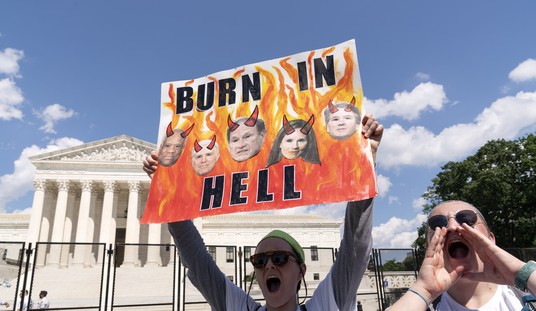As comic book fans all know, every superhero — or supervillain — has an origin story, the moment the protagonist sets himself apart from the common run of humanity to pursue a larger destiny. It should be no surprise that historical events have origin stories too, the moment when their core ideas are born and take their first uncertain root. Brexit, for example, according to an Oxford newspaper, may have started at the Queen’s Lane Coffee House in 1990 in discussions among radical Tory students.
Daniel Hannan, who recalls the moment, recalls that like most student endeavors, the idea of leaving the EU began as a revolt against the System. But in true comic book fashion, Hannan adds that in retrospect something else must have been born as well. For it must have been around that time the Left started becoming the party of the establishment. The switcheroo that we see around us today in full flower was only just starting. Hannan said:
In my day, being Eurosceptic was a sort of anti-systemic view. It went with being against big corporations and big government, and the establishment. It was for the people, against the elites. The shift in the last five years is one of the most extraordinary changes between then and now it’s such a shift to see people lining up on the same side as Goldman Sachs, arguing for the existing racket.
Over the last 30 years Harvard historian Niall Ferguson has witnessed the same strange trading of places. Ferguson notes that by some alchemy, the progressive moment has become the party of censorship.
Almost every month this year has seen at least one assault on free speech on an American college campus. In February the University of California, Berkeley, canceled a talk by Milo Yiannopoulos, the British “alt-right” journalist and provocateur, after a violent demonstration. In March students at Middlebury College in Vermont shouted down the sociologist Charles Murray and assaulted his faculty host. In April, it was the turn of conservative writer Heather MacDonald at Claremont McKenna and pro-Trump journalist Ann Coulter at Berkeley. …
No one could accuse the great Oxford zoologist Richard Dawkins of being right-wing. Yet last month it was his turn to be silenced. A public radio station in — you guessed it — Berkeley canceled a discussion of his latest book because (in the words of a spokesman) “he has said things that I know have hurt people,” a misleading allusion to the atheist Dawkins’s forthright criticism of Islam.
James Bloodworth in the left-of-center Independent noticed the exchange of roles too. “In the past decade or so some progressives have found themselves – either through political expediency or something worse – on the side of the far-right. … The result … has been an anti-war movement working enthusiastically with those advocating the murder of homosexuals, a left-wing Mayor of London embracing a man who said Adolf Hitler had been sent by Allah to punish the Jews, and a group set up ostensibly to oppose fascism warmly welcoming religious fascists into its own ranks.”
‘Tis witchraft. The populists now have the working class. The Western progressives rule at all the kingly courts: in Hollywood, the media, elite universities, in Washington and Brussels. Today social justice means government, regulation, constant nudging, endless investigations of suspicious sexual activity and and an unblinking cross-examination of anyone in contact with Russia.
Who could have predicted it? Nineteen sixty eight, recalled the Guardian in 2008, “was the year of revolt. It was a year of seismic social and political change across the globe. From the burgeoning anti-Vietnam war and civil rights movements in the United States, protests and revolutions in Europe and the first comprehensive coverage of war and resultant famine in Africa. The world would never be the same again.”
Never the same, but not in the expected way. What Rip Van Winkle, who closed his eyes in 1968, could have predicted the Soviet Union would disappear in 20 years, Vietnam would become an American ally against China, progressives would look with favor on sharia, the countries which Israel fought in 1967 would disintegrate and that the most urgent left-wing question of 2017 would be “are you now or have you ever been in contact with anyone from Russia?”
It turns out there were two mysterious flashes of light in 1990, two origin stories passing each other in the year after the Berlin Wall fell. One walked out with Daniel Hannan. The other, which he glimpsed only fleetingly, slipped like a shadow out the side door. There are at any rate two ideas struggling for the future of the world. One wonders when the Boss Fight will be.
Follow Wretchard on Twitter
For a list of books most frequently purchased by readers, visit my homepage.
Support the Belmont Club by purchasing from Amazon through the links below.
Books:
Outlaw Platoon: Heroes, Renegades, Infidels, and the Brotherhood of War in Afghanistan, by Sean Parnell and John Bruning. This book is Lieutenant Parnell’s personal account of the legendary U.S. Army’s 10th Mountain Division’s heroic stand in the mountains of Afghanistan. Acclaimed for its vivid, poignant, and honest recreation of sixteen brutal months of nearly continuous battle in the deadly Hindu Kesh, it is an action-packed, highly emotional true story of enormous sacrifice and bravery.
Afterlife – A Novel, by Marcus Sakey. From the author of the Brilliance Trilogy comes this mind-bending thriller that explores our most haunting and fundamental question: What if death is just the beginning?
The Clash of Civilizations and the Remaking of World Order, by Samuel P. Huntington. The classic study of post-Cold War international relations, more relevant than ever in the post-9/11 world.
Dog Company: A True Story of American Soldiers Abandoned by Their High Command, by Lynn Vincent and Roger Hill.
For a list of books most frequently purchased by readers, visit my homepage.
Did you know that you can purchase some of these books and pamphlets by Richard Fernandez and share them with your friends? They will receive a link in their email and it will automatically give them access to a Kindle reader on their smartphone, computer or even as a web-readable document.
The War of the Words, Understanding the crisis of the early 21st century in terms of information corruption in the financial, security and political spheres
Rebranding Christianity, or why the truth shall make you free
The Three Conjectures, reflections on terrorism and the nuclear age
Storming the Castle, why government should get small
No Way In at Amazon Kindle. Fiction. A flight into peril, flashbacks to underground action.
Storm Over the South China Sea, how China is restarting history in the Pacific
Tip Jar or Subscribe or Unsubscribe to the Belmont Club










Join the conversation as a VIP Member